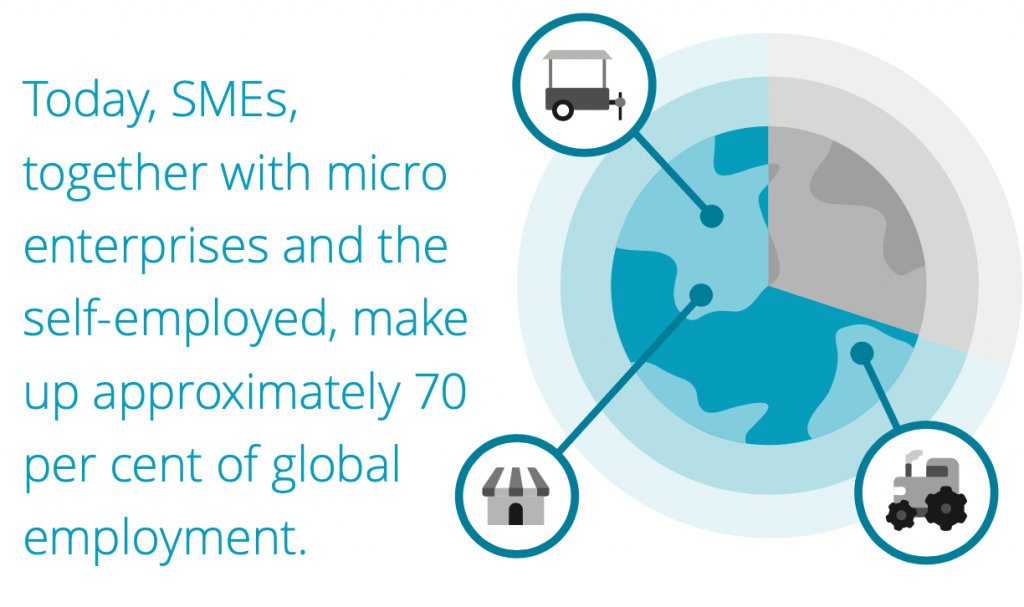Judging by the quantity and quality of standards, guidelines and instruments available, the field of responsible business conduct (RBC) has come a very long way in recent decades. [ii] Nevertheless, engagement with the various RBC standards is not universal across business.
One noticeably absent group is the vast small- and medium-sized enterprise (SME) community. Today SMEs, together with micro enterprises and the self-employed, make up approximately 70 per cent of global employment. [iii] Yet, they are excluded from most activities and initiatives, either by accident, circumstance, or design.
Meaningful progress across all business types, as set out in the UN Guiding Principles on Business and Human Rights, cannot be achieved without SMEs. Research and practice suggest that a different approach is needed. RBC standards are currently designed for the minority (large enterprises), with expectations that the majority (SMEs) will achieve the desired results. In addition, misaligned incentives are used as motivators and ill-fitting measurements are used as indicators of progress, or lack thereof. Therefore, this article, and longer related article, does not prescribe a one-size fits all approach but instead highlights the need for change in the design, implementation, and measurement of RBC standards.
Existing approaches to responsible business conduct are ill-designed for SMEs
Global business standards are, de facto, designed for and about large enterprises. In addition, metrics to measure progress against these standards are designed for large enterprises (high quality reporting on RBC standards) meaning SMEs are found inadequate as most of these measures do not take their different circumstances into account. Yet, SMEs are unable to influence formation and implementation of standards for a range of reasons including resource availability and capacity limitations.
Responsible business conduct drivers differ for SMEs
RBC standards are unsuitable drivers for SMEs. For SMEs, compliance with RBC standards is relatively expensive, profit maximization is not their sole driver, and they lack expertise in the topic and formal reporting practices. In addition, SMEs, often informally run, are driven by personal relationships and, crucially, the values of the owner-manager [iv].
Consequences of responsible business conduct standards are not always positive for SMEs
Notwithstanding some improvements globally, research suggests that, in some cases, the imposition of RBC on SME suppliers might result in: the withdrawal of otherwise qualified suppliers from contract competition; poor compliance processes that do not reflect practice; creative solutions to fake compliance; a negative effect on social performance; and undermining of the authenticity, identity and values of the SME.
One-size does not fit all
Research shows that successful progress in RBC is local context specific and requires a willingness to listen, collaborate and integrate approaches to RBC with SMEs and other non-corporate stakeholders. Meaningful contributions require an understanding of achieving scale and a willingness to work in partnership.
Changing the state of play
Large enterprises, governments and non-governmental organizations that are committed to RBC need to put SMEs at the centre of their thinking. Those in a position to represent the SME voice need to be ready and able to engage at a high level on the meaning of RBC for SMEs. Without a shift from the current approach, the global project to enhance social progress through business will remain incomplete. New approaches are needed to go beyond the changes already accomplished.
The responsibility for any opinions expressed rests solely with the authors. Publication does not constitute an endorsement by the ILO of any opinions, products, processes or geographical designations mentioned.
[i] Laura J. Spence is Professor of Business Ethics at Royal Holloway, University of London UK. Professor Spence publishes widely on corporate social responsibility and business ethics particularly in relation to small and medium sized enterprises. She also works with business and policy makers on how to support small business social responsibility.
[ii] Standards come in many forms. Our focus is on voluntary responsible business, transnational standards which multinational enterprises (MNEs) (perhaps adapt and) apply to their supply chains, requiring compliance of their suppliers. In many instances, there is considerable crossover with national legal frameworks. This is the nature of standards but for the purposes of the discussion here, we treat standards as transnational, voluntary, soft regulation that have been applied through supply chains through the leadership of MNEs.

